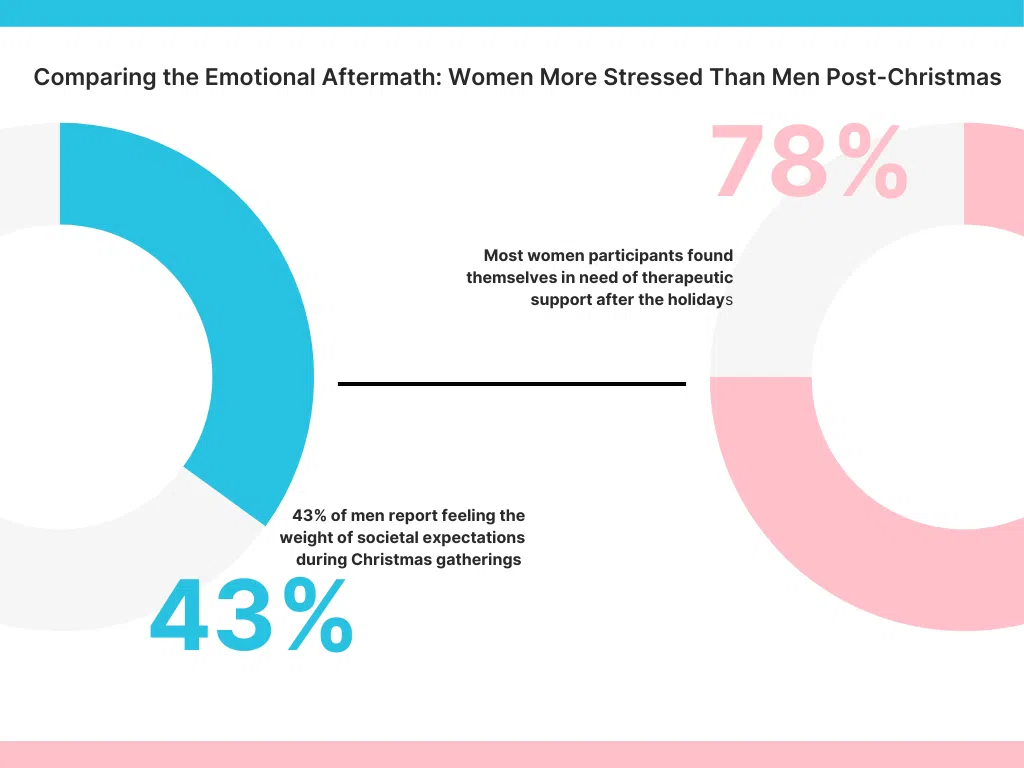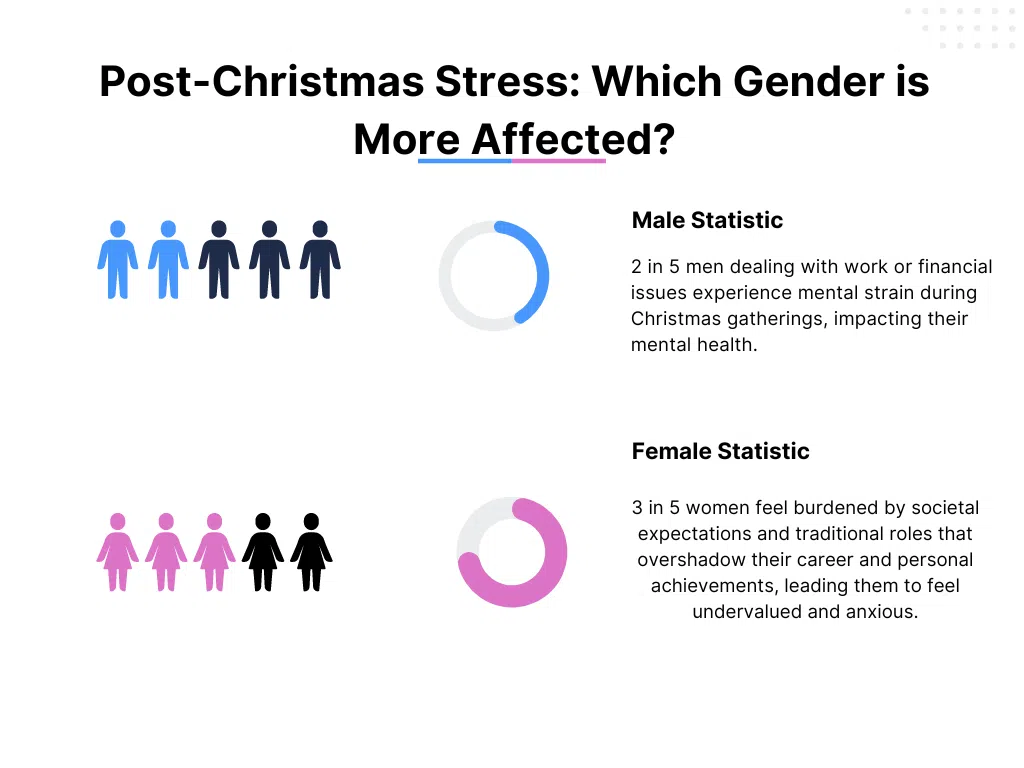Blog » Becoming a Coach » Jingle Bells to Therapy Tells: Uncovering the Emotional Aftermath of Christmas
Christmas Glooms: 3 out 5 Feel depressed after family gathering
While Christmas is often seen through a lens of joy, celebration, and family reunions, The Coach Foundation’s recent poll reveals a contrasting narrative. Conducted in first-world countries like the UK, US, and Australia, this comprehensive survey involving 1000 individuals aged 20-40, delves into the mental health effects of family gatherings during the Christmas season.

It offers an eye-opening look at the emotional complexities and challenges that lie beneath the festive facade.
The Unseen Aftermath of Holiday Gatherings
- A Shocking Need for Therapy: An astonishing 63% of participants reported a necessity for therapy post-Christmas family interactions. This means around 6 out of 10 people felt they needed help to deal with what happened during their holiday get-togethers
- Gender-Specific Stress: Notably, the survey highlights a stark disparity between genders, with 78% of the women participants finding themselves in need of therapeutic support after the holidays. This means almost every third woman felt the need for help to cope with what happened during their holiday time.
Christmas: A Time of Joy or Emotional Strain?
Christmas, with its emphasis on family reunions and societal festivities, inherently carries high expectations. These expectations can create a paradox where the pressure to experience joy and harmony can lead to feelings of anxiety, inadequacy, and isolation for those who find their reality falling short of these idealized experiences. The societal portrayal of Christmas as a flawless time of happiness often leaves little room for the acknowledgment of loneliness, familial conflicts, or personal struggles that can be exacerbated during this period.
The survey underscores that family gatherings, a central feature of Christmas, can be a significant source of stress. These gatherings, while offering a chance to reconnect, can also become arenas for unresolved tensions, comparisons, and judgment. For many, returning to a family environment means facing unresolved issues, navigating complicated relationships, or confronting past traumas. The expectation to maintain a facade of festive spirit in such situations can be mentally exhausting and emotionally draining.
Gender Disparity in Post-Holiday Stress
The data reveals a stark contrast: while 43% of men report feeling the weight of societal expectations during Christmas gatherings, a striking 78% of women participants find themselves needing therapy after the holidays. This considerable difference underlines that women are disproportionately affected by the emotional strain of the festive season.
Several factors contribute to this gender gap in stress levels. Women face intense societal pressure to conform to traditional roles, especially during family-oriented holidays like Christmas. Expectations around marriage, family plans, and domestic responsibilities often overshadow their professional and personal achievements. This undue emphasis can lead to a sense of being undervalued and lead to increased stress and anxiety.

Men’s Struggle with Expectations During Christmas
For many men, the festive season is more than just a time of celebration; it’s a period of introspection and often, significant stress, driven by deep-rooted societal norms. A notable percentage of men—43%—report grappling with the weight of societal expectations during Christmas gatherings. These men find themselves scrutinized, with their achievements, career progression, and financial status becoming focal points of holiday discussions.
This stress is not solely external; it’s internalized, leading to feelings of inadequacy or perceived failure. For men struggling professionally or financially, Christmas gatherings become a stark reminder of their challenges. The societal notion equating a man’s worth with his success and financial status emerges as a substantial source of stress, overshadowing the season’s joy.
Women’s Unique Pressures: The Shadow of Traditional Expectations
Conversely, women confront a distinct set of challenges, deeply entrenched in traditional societal roles. The poll indicates that an overwhelming 78% of women participants seek therapy after christmas. This indicates societal pressures at play that often relegate their professional achievements and personal aspirations to the background during family interactions, with persistent emphasis on marital status and family plans.

This reflects a broader societal trend that continues to emphasize traditional roles for women, despite strides towards gender equality. The holiday season, often associated with family and domesticity, tends to amplify these pressures. Women, particularly those who prioritize career or personal growth, find themselves in a position where they have to justify their life choices. This situation leads to feelings of being undervalued and misunderstood. Such dynamics not only diminish their accomplishments but also impose a significant emotional toll, transforming the festive season into a time of self-doubt and anxiety, rather than celebration and joy.
Conclusion
The Coach Foundation’s poll reveals a side of Christmas that’s often overlooked. While we often think of this time as happy and full of family fun, it turns out to be hard for many people, especially women. The big difference in stress levels after the holidays, with 78% of women needing therapy compared to 43% of men, tells us a lot. It’s important to see that Christmas isn’t just about good times and presents. There’s a lot more going on. These findings open up a big talk about mental health, family stress, and supporting each other during what can be a tough time of the year for many.
Methodology
In January 2024, 1000 individuals across first-world countries were surveyed post-christmas.

ABOUT SAI BLACKBYRN
I’m Sai Blackbyrn, better known as “The Coach’s Mentor.” I help Coaches like you establish their business online. My system is simple: close more clients at higher fees. You can take advantage of technology, and use it as a catalyst to grow your coaching business in a matter of weeks; not months, not years. It’s easier than you think.
AS SEEN ON
0 Comment